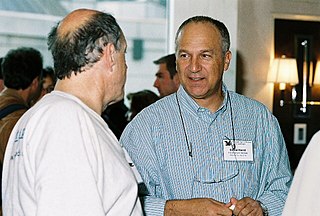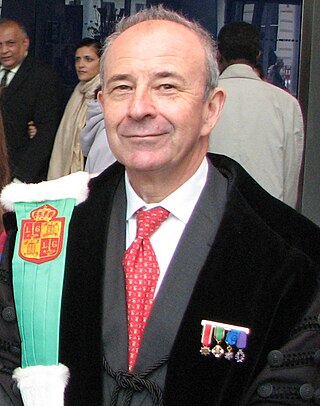Related Research Articles

National Hsinchu Senior High School is a high school in East District, Hsinchu City, Taiwan. Student enrollment averages around 2200.

David Harel is a computer scientist, currently serving as President of the Israel Academy of Sciences and Humanities. He has been on the faculty of the Weizmann Institute of Science in Israel since 1980, and holds the William Sussman Professorial Chair of Mathematics. Born in London, England, he was Dean of the Faculty of Mathematics and Computer Science at the institute for seven years.
Lin Yi-bing or Jason Lin is a Taiwanese academic who has served as the Chair Professor of the Department of Computer Science and Information Engineering (CSIE) at National Chiao Tung University (NCTU) since 1995, and since 2002, the Chair Professor of the Department of Computer Science and Information Management (CSIM), at Providence University, a Catholic university in Taiwan. He also serves as Vice President of the National Chiao Tung University.

Sami Erol Gelenbe, a Turkish and French computer scientist, electronic engineer and applied mathematician, pioneered the field of Computer System and Network Performance. Currently Professor in the Institute of Theoretical and Applied Informatics of the Polish Academy of Sciences, he is also a visiting professor at King's College London, Honorary Researcher in the I3S Laboratory, and the Abraham de Moivre Laboratory. Fellow of several National Academies, he Chairs the Informatics Section of Academia Europaea since 2023. His previous Professorial Chairs include the University of Liège (1974-1979), University Paris-Saclay (1979-1986), University Paris Descartes (1986-2005), NJIT (1991–93), ECE Chair at Duke University (1993-1998), University Chair Professor and Director of EECS, University of Central Florida (1998-2003), and Dennis Gabor Professor and Head of Intelligent Systems and Networks, Imperial College (2003-2019).

Chung Laung Liu, also known as David Liu or C. L. Liu, was a Taiwanese computer scientist. Born in Guangzhou, he spent his childhood in Macau. He received his B.Sc. degree in Taiwan, master's degree and doctorate in the United States.
Lydia E. Kavraki is a Greek-American computer scientist, the Noah Harding Professor of Computer Science, a professor of bioengineering, electrical and computer engineering, and mechanical engineering at Rice University. She is also the director of the Ken Kennedy Institute at Rice University. She is known for her work on robotics/AI and bioinformatics/computational biology and in particular for the probabilistic roadmap method for robot motion planning and biomolecular configuration analysis.
Munindar P. Singh is a SAS institute distinguished professor and a full professor in the Department of Computer Science at North Carolina State University. Singh is an IEEE Fellow, a AAAI Fellow, a AAAS Fellow, an ACM Fellow, a Member of Academia Europaea, and a ACM SIGAI Autonomous Agents Research Award recipient.
Leonid Libkin is a computer scientist who works in data management, in particular in database theory, and in logic in computer science.
Jordi Cortadella Fortuny is a Spanish computer scientist specializing in electronic design automation. He is a professor of computer science at the Polytechnic University of Catalonia.
Jinde Cao is an Endowed Chair Professor at Southeast University, Nanjing, China. He is a Distinguished Professor, the Dean of School of Mathematics and the Director of the Research Center for Complex Systems and Network Sciences at Southeast University.
Yaochu Jin was born in Wujiang, Jiangsu Province, China in 1966. He received the B.Sc., M.Sc., and Ph.D. degrees from Zhejiang University, Hangzhou, China, in 1988, 1991, and 1996, respectively, and the Dr.-Ing. degree from Ruhr University Bochum, Germany, in 2001.
Franco Zambonelli is a full professor in Computer Science at the University of Modena and Reggio Emilia, Italy, since 2010.
Hong-yuan Mark Liao is a Taiwanese computer scientist specialized in the field of multimedia information processing and AI.
Gene Tsudik is a Distinguished Professor of Computer Science at the University of California, Irvine (UCI).
Xuelong Li is a professor and National Distinguished Chair at the Northwestern Polytechnical University (NWPU) working in artificial intelligence and computer vision.
Mei Hong is a Chinese computer scientist, a professor at Peking University, the director of Key Laboratory of High Confidence Software Technologies of Ministry of Education (MOE) at Peking University. He serves as President of the China Computer Federation (2020-2024), formerly the Vice President of The Academy of Military Sciences, Beijing Institute of Technology, and Shanghai Jiao Tong University. He is an academician of the Chinese Academy of Sciences, a foreign member of the Academia Europaea, a fellow of The World Academy of Sciences, an IEEE Fellow, and an ACM Fellow.

Janusz Kacprzyk is a Polish engineer and mathematician, notable for his contributions to the field of computational and artificial intelligence tools like fuzzy sets, mathematical optimization, decision making under uncertainty, computational intelligence, intuitionistic fuzzy sets, data analysis and data mining, with applications in databases, ICT, mobile robotics and others.
Xiaoming Fu is a Chinese German computer scientist. He is a Full Professor of Computer Science with focus on Internet technologies at Universität Göttingen. His research interests include architecture, protocols and applications of networked systems including mobile and cloud computing, network security, social computing and big data.
Marija D. Ilić is a Serbian-American electrical engineer known for her work on the control and pricing of large electrical power systems. She is a professor emerita of electrical and computer engineering at Carnegie Mellon University, a senior research scientist at the Laboratory for Information & Decision Systems at the Massachusetts Institute of Technology, a senior staff member at the MIT Lincoln Laboratory, and the founding chief scientist of New Electricity Transmission Software in Massachusetts.
Paola Inverardi is an Italian computer scientist specializing in software engineering. She is a professor in the Department of Information Engineering, Computer Science, and Mathematics at the University of L'Aquila in Italy, and the former rector of the university.
References
- ↑ Xuemin Lin - Biography, Academia Europaea, retrieved 15 October 2024
- ↑ "2016 elevated fellow" (PDF). IEEE Fellows Directory. Archived from the original (PDF) on 23 December 2015.